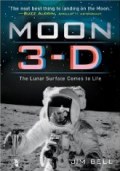 Summer science reading requires a sequel as I suspect most of you have read all the previous recommendations for science books, or if you haven’t you’re not likely to pick them up now. So here are a few more choice tomes.
Summer science reading requires a sequel as I suspect most of you have read all the previous recommendations for science books, or if you haven’t you’re not likely to pick them up now. So here are a few more choice tomes.
In this 40th anniversary year of the first manned moon landing, Jim Bell brings the lunar surface into stunning three-dimensional relief in Moon 3-D. I am sure children will enjoy this book for the 3D pictures alone. There are plenty of words too, but you’re going to look very silly on the beach this summer with your Moon 3D specs on squint at moon buggies, astronauts, and craters.
Mark Changizi, in The Vision Revolution, is not trying to understand how the brain works the way it does, instead he wants to find out why it works that way. Changizi is a theoretical neurobiologist and his insights could overturn everything we thought we knew about human vision.
What the drug companies won’t tell you and your doctor doesn’t know is not the snappiest of titles and the presence of Andrew Weil’s name on the cover was not a deciding factor in my listing this book. Author Michael Murray is described as a leading authority on natural medicine, whatever that is and his book seems to suggest that so-called modern medicine has created the so-called health crisis we currently face. It always irritates me to read phrases like “natural medicine” as if popping any drug, whether made in a pharma factory or dug up and brewed into a tea is any differently natural. Judge for yourself, but it looks like a conspiracy theory to me.
Russell Foster and Leon Kreitzman in Seasons of Life discuss the biological rhythms that living things need to thrive and survive. The season of our birth, apparently, can affect our physiology in many ways, including asthma, possibly autism, eating disorders, and even Alzheimer’s disease and schizophrenia in later life. It seems somehow vaguely plausible. It will be interesting to see whether the theories of Foster and Kreitzman bear up to close scrutiny.
In The Selfish Genius (geddit?), Fern Elsdon-Baker discusses how Richard Dawkins rewrote Darwin’s legacy. On 1st July 1858, Charles Darwin unveiled his (in)famous theory of natural selection, who was to know that it would still be causing such an intellectual crisis more than a century and a half later. While Dawkins has certainly helped give prominence to evolution, Elsdon-Baker takes issue with his neo-Darwinist spin on the theory. As a pro-science atheist and specialists in the history and communication of evolutionary theory she alludes to the idea that Dawkins’ prescriptive and restrictive approach to the evolution of life on earth may have Darwin spinning in his grave.
Finally, Fixing Climate definitely has the snappiest title of this latest round up of summer science reads. But, a snappy title is what you would expect from the scientist who coined the phrase “global warming” back in 1975. Wallace Broecker, and co-author Robert Kunzig describe Earth’s volatile history and the origins of anthropogenic climate change. Their solution to the imminent global catastrophe is to remove carbon waste from the atmosphere and in support of the concept, Broecker is backing the development of artificial trees that can sequester carbon dioxide from the atmosphere. There are many such schemes around, whether we can offset the energy and resources to implement them on a global scale remains to be seen.